
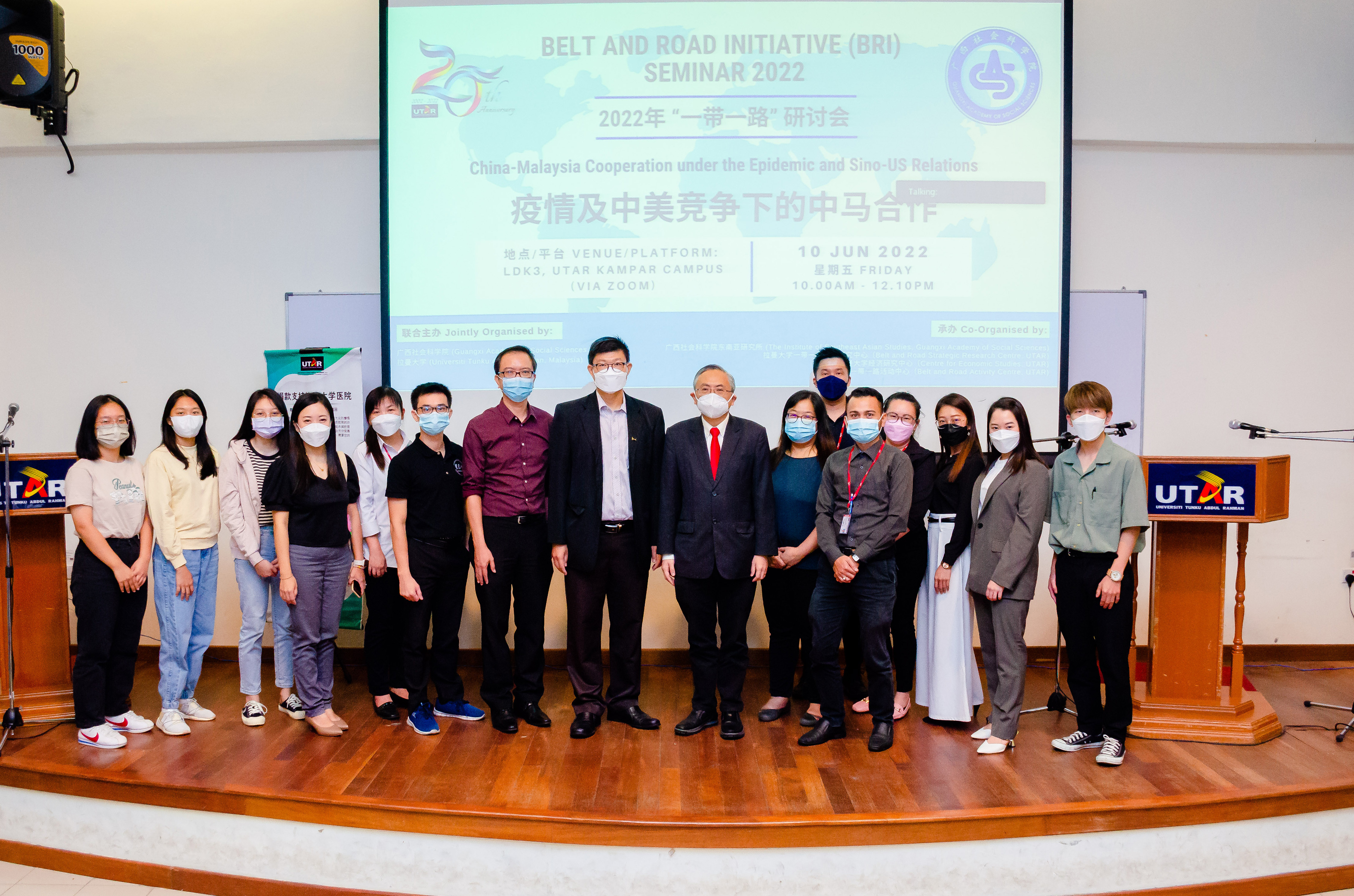
Prof Ewe (sixth from right) and Prof Choong (eighth from left) with the participants at UTAR Kampar Campus
Belt and Road Initiative (BRI) Seminar 2022 was jointly organised by Guangxi Academy of Social Sciences (GXASS) and UTAR on 10 June 2022. It was held at Guang Xi and UTAR Kampar Campus via hybrid mode.
Themed China-Malaysia Cooperation under the Epidemic and Sino-US Relations (疫情及中美竞争下下的中马合作), the half-day seminar was co-organised by UTAR’s Belt and Road Strategic Research Centre, Centre for Economic Studies, and Belt and Road Activity Centre.
The seminar aimed to provide a platform for participants from Malaysia and China to have a deeper discussion on issues related to Malaysia-China cooperation and development in the post-pandemic era.
Invited to officiate the seminar was Consul General of Malaysia in Nanning Mr Azlimi Zakaria, Consul General of the People’s Republic of China in Penang Dr Lu Shiwei, UTAR President Ir Prof Dr Ewe Hong Tat, Guangxi Academy of Social Sciences Vice President Xie Guihai and UTAR Vice President for Student Development and Alumni Relations Prof Dr Choong Chee Keong. Also present were BRI Seminar 2022’s speakers, commentators, and academics from UTAR and GXASS.
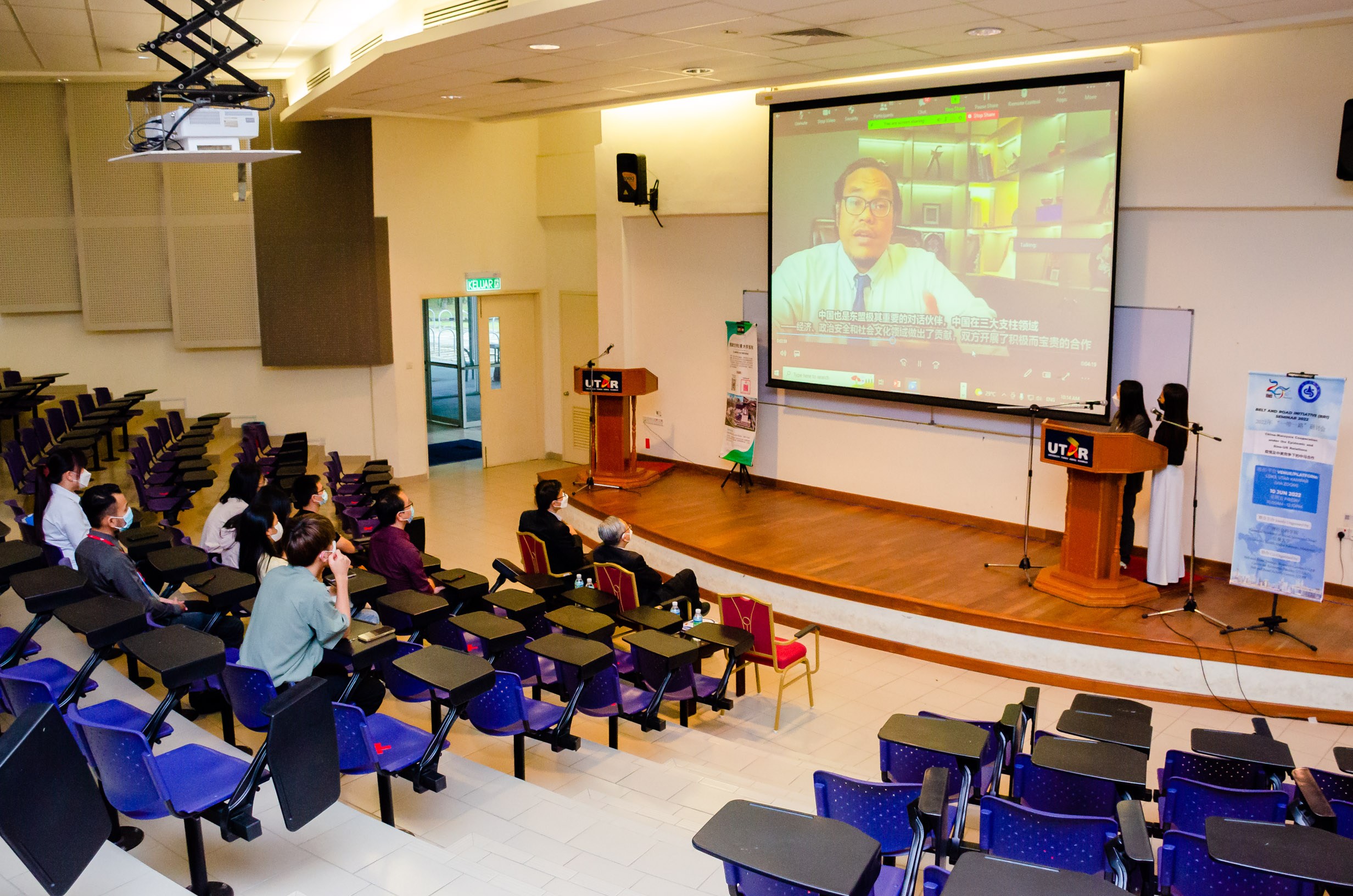
Mr Azlimi underlining the good relationship between Malaysia and China
Consul General of Malaysia in Nanning Mr Azlimi expressed his appreciation to the organisers and said, “I would like to applaud both institutions for your tireless work in promoting healthy exchanges and cooperation in the higher education sector between Malaysia and China. This has led to a growing camaraderie between our youth and future generations, thus simultaneously promoting closer cooperation between both countries.”
He added, “To this day, China has been Malaysia’s largest trading partner for the past 12 years and one of our largest foreign investors. China is also an extremely important dialogue partner to ASEAN with its active and valuable cooperation and contributions in all three main pillars of ASEAN; Economy, Political Security and Socio-Cultural. Furthermore, Malaysia and China have always believed in the importance of dialogues and positive approaches, especially in times of crisis. For example, during the rise of the COVID-19, Malaysia was one of the first few countries to extend its assistance to China. Similarly, when Malaysia was hit by the pandemic, China was quick to lend its helping hand. It is evident that challenges and obstacles have never dampened the relationship between both countries. In fact, challenges and obstacles seem to have strengthened our brotherly relations and paved the way for deeper and more meaningful cooperation.”
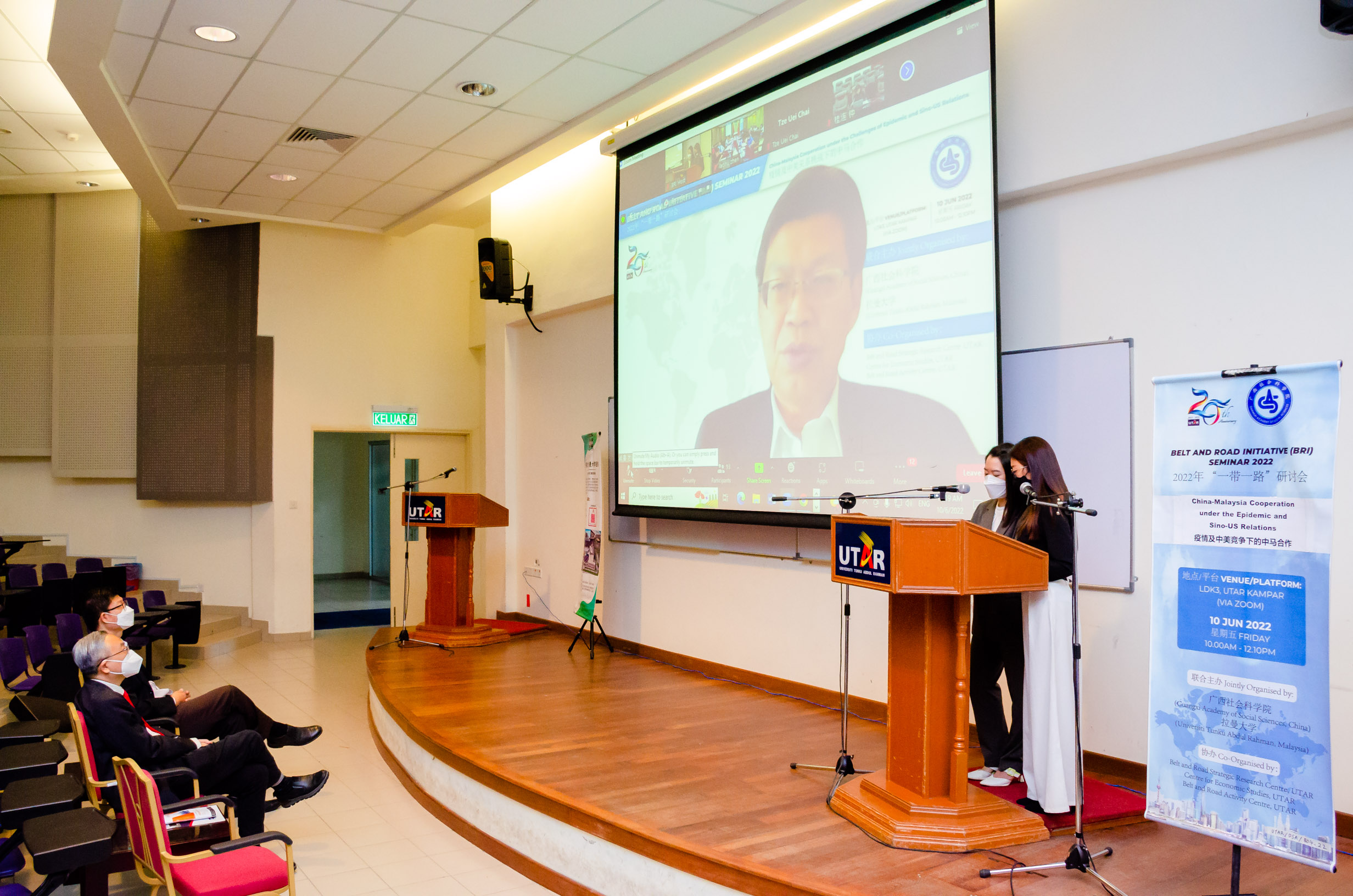
Dr Lu emphasising the importance of China-Malaysia cooperation in the post-pandemic era
Consul General of the People’s Republic of China in Penang Dr Lu Shiwei congratulated the organisers on the success of the event. He mentioned, “The seminar is meaningful to the international situation as now the world is facing the intertwined between world’s century-old changes and pandemic, the in-depth adjustment of international relations, increasingly fierce competition among major powers and the international and regional cooperation are facing challenges. This year marks the 48th anniversary of the establishment of diplomatic relations between China and Malaysia. No matter how the international situation changes, the relationship between both countries has always maintained strong vitality. Therefore, promoting the sustainable, stable and healthy development of China-Malaysia relations is in the common interests of both countries, and is also the consensus of all political factions and all sectors of society in Malaysia. In the post-pandemic era, China and Malaysia’s cooperation has huge potential and broad prospects for further growth. How to continue to develop on the basis of past achievements, seize bilateral and regional cooperation opportunities, promote high-quality development of the BRI, and promote China-Malaysia comprehensive strategic partnership to a new level are all topics worthy of in-depth study.”
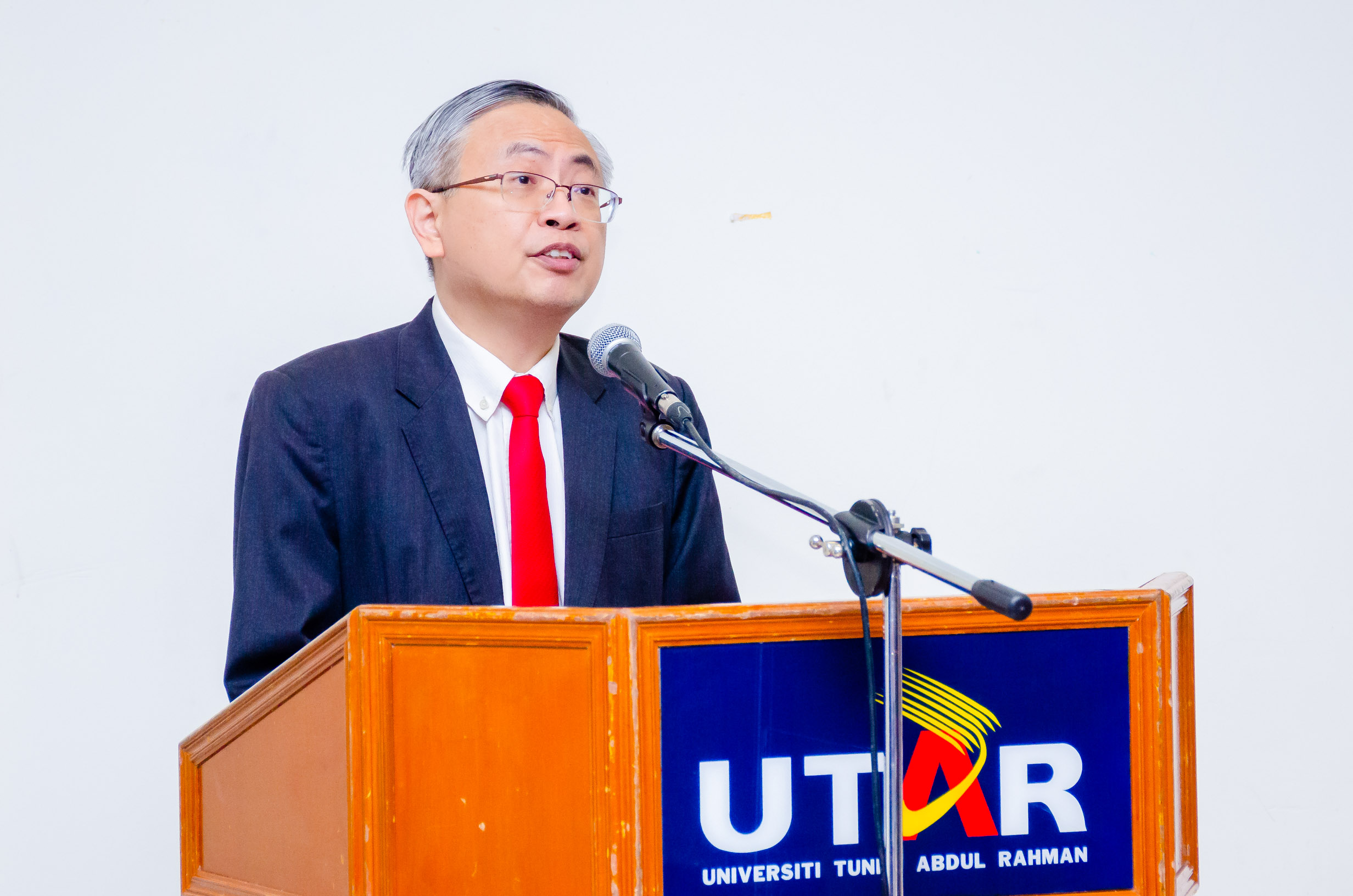
Prof Ewe sharing the University’s efforts in BRI research and initiatives
In his welcome speech, UTAR President Ir Prof Dr Ewe Hong Tat expressed his gratitude to GXASS for collaborating with UTAR and making this event successful. He said, “UTAR is honoured to be part of the organisers for this seminar and to contribute to this seminar which marked a new milestone for the cooperation between Malaysia and China. We would also like to thank all the speakers and commentators from Malaysia and China for sharing their valuable insight and expertise with the participants.”
He then shared the University’s efforts in research and initiatives related to BRI over the years. He revealed, “The efforts include the academic team’s active contribution to research related to BRI; the establishment of Belt and Road Strategic Research Centre, Belt and Road Activity Centre; carrying out international/university-industry cooperation and research related to BRI; organising academic activities such as seminar, forum and many more. UTAR hopes that the research and cooperation related to the BRI of the University will be able to reach a higher level in the future, and will continue to do its best to promote the academic connection between Malaysia and China on BRI.”
Guangxi Academy of Social Sciences Vice President Xie Guihai gave a brief introduction on the establishment and development of GXASS and said, “Established in 1977, GXASS is a research institution with profound historical background in Guangxi. Since its establishment, the Academy has been committed to taking ASEAN studies as a key research direction and an important research feature for more than 40 years. Therefore, we have become a research base with a high reputation and influence for ASEAN studies in China and abroad.”
“We would like to take today’s opportunity to thank experts from Malaysia and China for their strong support, especially to UTAR. UTAR Vice President Prof Choong has been invited many times to participate in our ‘China-ASEAN Think Tank Strategic Dialogue Forum’ and has maintained a close connection with our academy and scholars. This is our first joint seminar with UTAR, therefore, we are looking forward to the potential collaboration in cooperative research, conference, talents exchanges and many more, continuing to contribute to the development of the bilateral relations between the two countries,” he added.
The seminar covered three significant themes, including “the impact of China-US competition on Malaysia and the development of China-Malaysia relation”, “Malaysian political changes and its situation analysis” and “Prospects for China-Malaysia economic and trade cooperation in the post-pandemic era”. There were seven keynote speeches in the seminar, conducted by experts and scholars from China and Malaysia. Speakers from UTAR were Centre for International Studies Chairperson Dr Tan Wooi Yee who presented on the “Malaysia’s hedging policy amid US-China competition”, Faculty of Creative Industries academic Liew Wui Chern who presented on “Malaysia’s political situation and prospects in the post-pandemic era”, and Faculty of Business and Finance academic Prof Dr Wong Chin Yoong who presented on the “Strategic significance of China-US Conflict and ASEAN from a marginal analysis”.
The seminar ended with a closing remark by Prof Choong.
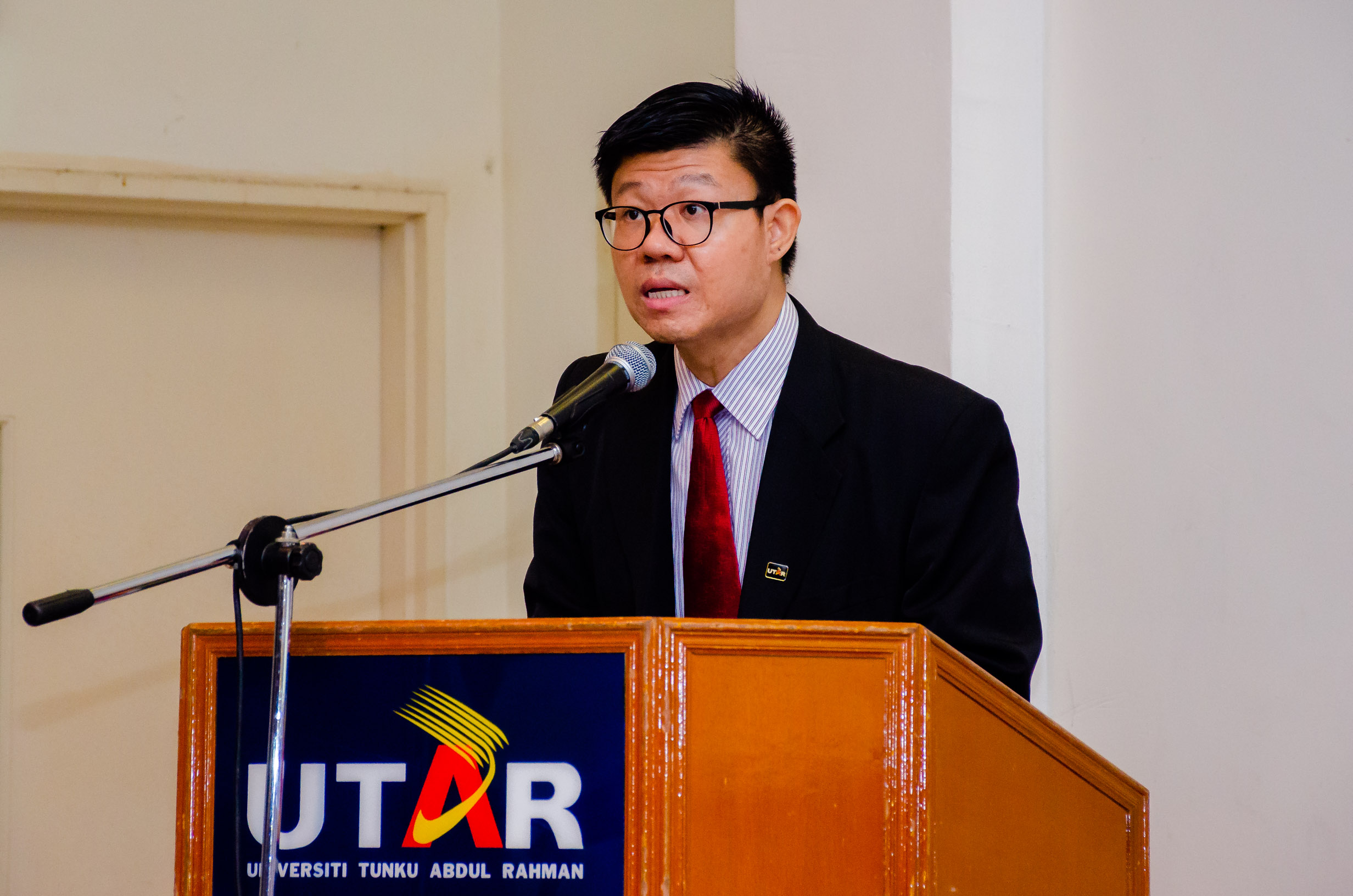
Prof Choong thanking the guests, speakers and participants
© 2022 UNIVERSITI TUNKU ABDUL RAHMAN DU012(A).
Wholly owned by UTAR Education Foundation (200201010564(578227-M)) LEGAL STATEMENT TERM OF USAGE PRIVACY NOTICE